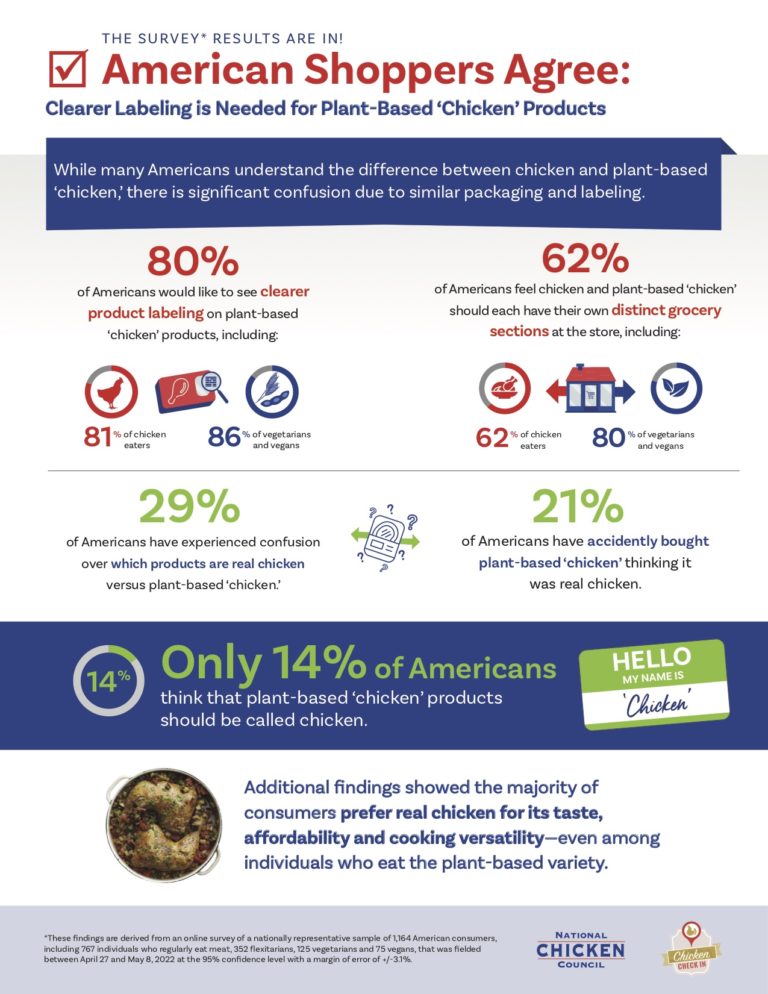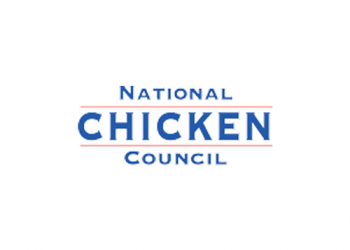With an estimated 15,000 new food products introduced to the marketplace each year, it’s little wonder grocery shelf products are always evolving. Plant-based ‘chicken’ and cell-cultured ‘meat’ alternatives are among them. But it often isn’t clear that consumers are looking at or even purchasing such products—mistaking them for real chicken meat—as some shoppers may falsely assume. While the National Chicken Council (NCC) recognizes consumers have a variety of dietary preferences and support individual choice, the U.S. chicken industry stands for clear product labeling and distinct shopping sections. Here’s a closer look at the marketing shifts that need to happen for consumers to make informed shopping decisions in the midst of plant-based and cell-cultured ‘chicken’ alternatives.
Plant-based ‘chicken’
Some plant-based protein products do not contain any amount of poultry, yet bear the name ‘chicken’ on their labels, implying the product is derived from animals and contains real chicken meat.
Again, we respect the fact that consumers have more product choices than ever. As much as the U.S. chicken industry believes consumers should enjoy a balance of chicken and plants—not one or the other—we advocate for plant-based alternatives to be accurately labeled in a way that clearly explains what they are and how they were made.
Regardless of dietary preferences, a national spring 2022 survey* revealed American consumers overwhelmingly agreed there’s a need for:
- Clearer product labeling and;
- Separate shopping sections for plant-based products.
These findings resonated among meat eaters, flexitarians, vegetarians and vegans alike. More specifically:
- Four in five Americans (81 percent of chicken consumers, along with 86 percent of vegetarians and vegans) want plant-based options to clearly be labeled.
- At least three in five Americans (62 percent of chicken consumers along with 80 percent of vegetarians and vegans) feel real chicken and plant-based ‘chicken’ should have their own distinct grocery sections at the store to help eliminate product confusion.
- One in five Americans (21 percent) have reported that they accidentally purchased the plant-based product, believing it to be real chicken.
- Consumers who have experienced such confusion point to plant-based packaging and labeling as imitating those of authentic chicken products too closely.
- 69 percent of Americans agree the term ‘meat’ should only refer to products made from animals.
- Only 14 percent of Americans think that ‘chicken’ is the appropriate name for plant-based ‘chicken.’
So what does the NCC urge the Food and Drug Administration (FDA) and U.S. Department of Agriculture (USDA) do about these findings?
These agencies have the potential to issue clearer guidance defining how to name these plant-based products and prioritize enforcement for products marketed in a misleading manner. This has motivated us to write a letter to the FDA and USDA, and submit official comments along with the survey results to FDA Docket 2021-N-0553, ‘Labeling of Plant-Based Alternatives to Animal-Derived Foods.’
Our main concern is that plant-based proteins marketed as ‘chicken’ are misbranded under the Federal Food Drug and Cosmetic Act, because their labeling misleadingly indicates that the products contain real chicken meat and are nutritionally comparable to real chicken meat. And yet, neither case is true.
We also want to draw attention to the fact that the USDA Food Safety and Inspection Service has long overseen a well-established set of regulations and policies for how poultry products are supposed to be labeled. Likewise, the Poultry Products Inspection Act prohibits the labeling of products in a false or misleading manner, as well as the marketing of one food under the name of another.
As the FDA develops its guidance, we encourage the agency to adopt the following principles, which NCC believes will ensure fairness and clarity in the marketplace:
- Plant-based protein products should be labeled in a manner that clearly discloses they are made using plant protein.
- Plant-based protein products should not be labeled in a manner that implies they are made from or are comparable to products made from animal protein.
- Plant-based products should not be labeled or marketed using the names of specific animals (e.g., “chicken”) or using terms specifically recognized in Food Safety Inspection Service (FSIS) regulations or policy as indicating the product is made using animal protein (e.g., “chicken tender” or “chicken tenderloin”), even if the label elsewhere references the plant-based nature of the product.
- If variations on established animal or product names are used in the labels or marketing of these products, the product must be readily identifiable as not being an animal product, and the term must be immediately accompanied in all instances by a clear and equally prominent disclosure that the product is plant-based.
- Claims that plant-based products are superior to conventional animal proteins should be prohibited unless such a claim is substantiated by scientific evidence.
The complete NCC plant-based ‘chicken’ comments are available here.
Source:
*These findings are derived from an online survey of a nationally representative sample of 1,164 American consumers, including 767 individuals who regularly eat meat, 352 flexitarians, 125 vegetarians and 75 vegans, that was fielded between April 27 and May 8, 2022 at the 95% confidence level with a margin of error of +/-3.1%.












